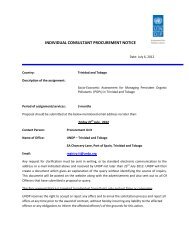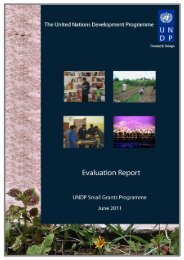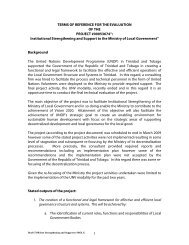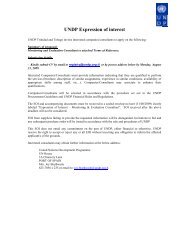The View from the Boardroom - UNDP Trinidad and Tobago
The View from the Boardroom - UNDP Trinidad and Tobago
The View from the Boardroom - UNDP Trinidad and Tobago
You also want an ePaper? Increase the reach of your titles
YUMPU automatically turns print PDFs into web optimized ePapers that Google loves.
<strong>The</strong> <strong>View</strong> <strong>from</strong> <strong>the</strong> <strong>Boardroom</strong> - CEO Study on Corporate Social Responsibility in <strong>Trinidad</strong> <strong>and</strong> <strong>Tobago</strong>CHAPTER 1CSR in <strong>Trinidad</strong> <strong>and</strong> <strong>Tobago</strong> – Strategic Evolution or Preserving <strong>the</strong> Status Quo?“CSR affects yourcorporate image. To <strong>the</strong>extent that your corporateimage that is out <strong>the</strong>re ispositive <strong>the</strong>n one wouldexpect <strong>the</strong>re to be sometype of benefit <strong>from</strong><strong>the</strong> sales perspectivethrough support <strong>from</strong><strong>the</strong> communities. It is<strong>the</strong>refore a good businessdecision as it creates apositive corporate image<strong>and</strong> that should lead tomore people supportingyour company.”Errol Le Blanc, CEOUnicomerSecondly, in overseeing <strong>the</strong>irrespective CSR programmes <strong>and</strong>budgets, 60% of all CEOs mentioned<strong>the</strong> criteria of Employee Motivation<strong>and</strong> Team-Building in defining <strong>the</strong>business case for sustainability action.This result reflects positively on <strong>the</strong>progress seemingly made in <strong>the</strong> area ofinternal CSR <strong>and</strong> in raising awarenessabout <strong>the</strong> business benefits of differentforms of employee engagement suchas corporate volunteerism. Ra<strong>the</strong>rthan seeing investment in employeerecognition, fair labour practices <strong>and</strong>What are <strong>the</strong> most important considerations forhow you define <strong>the</strong> Business case for CSR?11.4%25.7%60.0%71.4%Br<strong>and</strong>, Trustworthiness <strong>and</strong> ReputationEmployee Motivation <strong>and</strong> Team-BuildingIncreased competitivenessLicense to operate in communitiesvoluntary participation of staff incommunity development activities asa financial burden on <strong>the</strong> company,an increasing number of managershave come to appreciate CSR as away to streng<strong>the</strong>n competitiveness,reduce operational costs <strong>and</strong>increase productivity as a result ofimprovements in staff motivation <strong>and</strong>solidified team structures. Thirdlyano<strong>the</strong>r important filter throughwhich CEOs assess <strong>the</strong> value thatCSR can add to <strong>the</strong> commercialsuccess <strong>and</strong> market of <strong>the</strong> criterionof obtaining a License to Operate inCommunities. Such emphasis on <strong>the</strong>importance of securing social accessto local communities highlights<strong>the</strong> ‘environment gatekeeper’ <strong>and</strong>‘peacemaker’ function that corporateinvolvement in <strong>the</strong> developmentof fenceline communities has formany industries <strong>and</strong> business types.Recognising <strong>the</strong> license to operate as amain element of <strong>the</strong> CSR business casecan be seen as an acknowledgementby local businesses of <strong>the</strong> crucialimportance of communal buy-in asit relates to approving <strong>and</strong> accepting<strong>the</strong>ir presence <strong>and</strong> operations on <strong>the</strong>ground. As one executive has put it:“It is this concern about <strong>the</strong> operatingenvironment, <strong>and</strong> a firm’s license tooperate which provides much of <strong>the</strong>impetus for many corporations […]to undertake a broader role in societalaffairs.” 14Securing community support forcommercial operations has <strong>the</strong>potential to help boardrooms,particularly those of multinationalcompanies <strong>and</strong> <strong>the</strong>ir local subsidiariesto reduce <strong>the</strong> costs associated withpossible delays in production <strong>and</strong>extraction caused by social activism,various forms of civil unrest <strong>and</strong>community resistance againstcorporate investment <strong>and</strong> timeconsuminglegal battles. As such,it increasingly seen as a tool for riskmitigation. And finally, 11.4% of allCEOs interviewed for this reportmentioned Increased Competitivenessas an important feature of <strong>the</strong>CSR business case. Such firm-levelcompetitiveness gains through CSRmay be achieved in <strong>the</strong> realms ofcosts savings as well as throughvalue creation in <strong>the</strong> fields of humanresources, customer relations,innovation <strong>and</strong> risk <strong>and</strong> reputationmanagement. 15 <strong>The</strong> relatively lownumber of CEOs whose thinkingabout <strong>the</strong> commercial relevance ofCSR is guided by considerations ofgaining a competitive advantage14 Dr. Gary Dirks, ‘CSR – A <strong>View</strong> <strong>from</strong> BP’, Speech delivered at <strong>the</strong> CSR Forum, held at <strong>the</strong> School of Economics <strong>and</strong> Management, Tsinghua University, China, April 2004.15 See European Competitiveness Report 2008, pp. 107-116.22
















